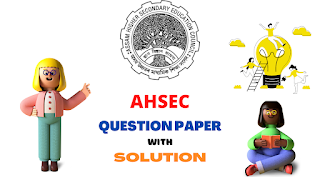AHSEC| CLASS 12| FINANCE| SOLVED PAPER - 2016| H.S. 2ND YEAR
2016
FINANCE
Full Marks: 100
Pass Marks: 30
Time: Three hours
The figures in the margin indicate full marks for the questions.
1. Answer as directed: 1x8=8
(a) Which is the first Development Bank established in India?
Ans:- The Industrial Finance Corporation of India.
(b) What is primary market?
Ans:- The primary market is where securities are first sold to raise long-term capital for businesses. It is basically responsible for obtaining new points. Therefore it is also called new issue market.
(c) In which year fourteen Indian commercial banks were nationalised?
Ans:- In 19 July 1969.
(d) What do you mean by scheduled bank?
Ans:- By definition, any bank which is listed in the Second Schedule to the Reserve Bank of India Act, 1934 is considered a scheduled bank. The Schedule includes those banks which satisfy various parameters, criteria under Section 42 of this Act.
(e) Capital market is the market for long-term fund. (State whether True or False)
(f) Write the full form of MMMF.
Ans:- Money market mutual funds.
(g) A collecting banker can claim statutory protection only in the case of crossed cheque. (Fill up the blank)
(h) What is statutory liquidity ratio?
Ans:- Statutory Liquidity Ratio or SLR is the minimum percentage of deposits that a commercial bank must maintain in the form of liquid cash, gold or other securities.
2. Name two departments of the Reserve Bank of India. 2
Ans:- Reserve Bank of India has two departments:-
(i) Issue Department: This department deals with the activities related to issue of money.
(ii) Banking Department: This department handles various bank services for the government as well as other banks.
3. What is meaning of cash credit? 2
Ans:- It is a method of lending by a commercial bank under which a short-term secured cash loan is provided to the borrower by the bank and the borrower can withdraw the amount in a single installment or in multiple installments as per his needs.
4. State the ‘minimum reserve system’ of note issue. 2
Ans:- Minimum Reserve System under which RBI is required to maintain a minimum reserve of Rs 200 crore consisting of foreign currencies, gold coins and gold bullion (minimum Rs 115 crore in the form of gold). There is no limit for RBI to issue currencies by keeping this minimum reserve.
5. Who can cross a cheque? 2
Ans:- The holder of a cheque is authorized to cut the cheque, either generally or specifically if the cheque is not crossed. He is also entitled to cross the cheque, especially if it has been cut normally. He may also add the words "non-negotiable" to ordinary and specially crossed cheques.
6. Define endorsement. 2
Ans:- Endorsement in banking is the assurance of a bank that it will honor a check or any other negotiable document of one of its customers, which also includes a banker's endorsement.
7. State the meaning of Development Bank with example. 3
Ans:- Development banks are nothing but financial institutions providing long-term funds for capital-intensive investments over a long period of time. The rate of return on their borrowings is low, such as in irrigation systems, urban infrastructure, mining and heavy industries etc.
Development banks are specialized institutions that provide medium and long-term credit facilities. Their main objective is to serve the public interest instead of earning profits. They provide financial assistance to institutions in both public and private sectors.
8. Briefly explain the utility services rendered by the commercial banks. 3
Ans:- A commercial bank provides the following important general utility services:-
(i) It allows simple and fast transfer of payments from one place to another using drafts, cheques, TT, MT and other methods.
(ii) It issues letters of credit, gift cheques, travelers checks and other similar documents.
(iii) It handles foreign exchange transfers, assisting exporters and importers alike.
9. Write a brief note on capital market. 3
Ans:- Capital markets are places where savings and investments circulate between suppliers who have capital and those who need capital. Institutions holding capital include retail and institutional investors while those seeking capital include businesses, governments and individuals.
Capital markets want to improve transaction efficiency. These markets bring together those holding capital and those seeking capital and provide a place where institutions can exchange securities.
Or
Write a short note on foreign exchange market.
Ans:- The foreign exchange market is a market in which participants are able to sell, buy, convert and exchange currencies. The foreign exchange markets are made up of investment management firms, banks, central banks, hedge funds, commercial companies and investors, and retail foreign exchange brokers.
The major participants involved in the foreign exchange market are foreign exchange brokers, commercial banks and other legitimate dealers and monetary authorities. It is important to note that although participants may have their own trading centers, the market itself is spread around the world. There is close and constant interaction between trading centers, and there is more than one market where participants can deal.
10. Draw specimen of a blank cheque. 3
Ans:-
11. State any three differences between bills of Exchange and Promissory Note. 3
(Buy E-Books to read complete solutions)
DOWNLOAD [PAGE LINK:-CLICK HERE]
***
FINANCE SOLVED PAPERS PAGE LINK - Click here
BUY E-BOOK (PDF FILE)
[TO SEE FULL SOLUTION]
(Chapter wise Notes, Exam Question Papers solved, MCQ solved) [ARTS, COMMERCE, SCIENCE]
|
DOWNLOAD [PAGE LINK:-CLICK HERE] |
AHSEC PAGE LINK - CLICK HERE


